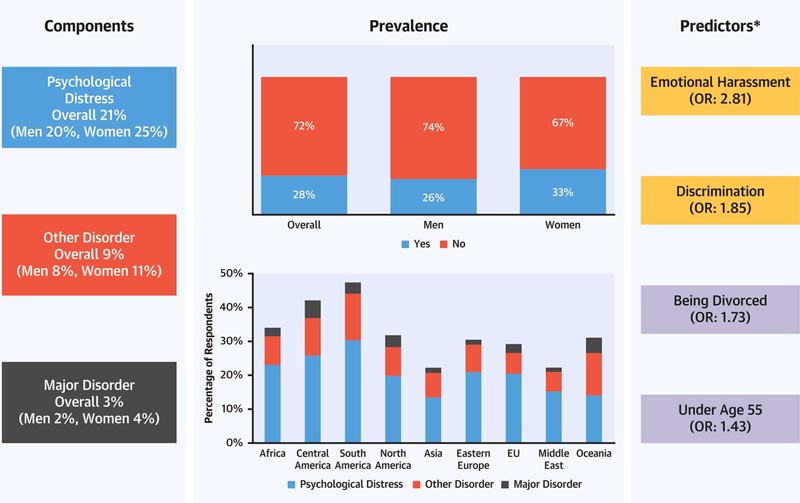Mental illness among physicians is an increasingly recognized concern. Global data on mental health conditions (MHC) among cardiologists are limited.
The purpose of this study was to investigate the global prevalence of MHC among cardiologists and its relationships with professional life.
The American College of Cardiology conducted an online survey of 5,931 cardiologists worldwide in 2019. Data on demographics, practice, MHC, and association with professional activities were analyzed. P values were calculated using chi-square, Fischer’s exact, and Mann-Whitney U tests. Univariate and multivariate logistic regression analysis determined the association of characteristics with MHC.
Globally, 1 in 4 cardiologists experience any self-reported mental health condition (MHC), including psychological distress or a major or other psychiatric disorder. There is significant geographic variation in MHCs, with highest and lowest prevalences in South America (39.3%) and Asia (20.1%) (P < 0.001).
Predictors of MHC included experiencing emotional harassment (OR: 2.81; 95% CI: 2.46-3.20), discrimination (OR: 1.85; 95% CI: 1.61-2.12), being divorced (OR: 1.85; 95% CI: 1.27- 2.36), and age < 55 years (OR: 1.43; 95% CI: 1.24-1.66).
Women were more likely to consider suicide in the past 12 months (3.8% vs. 2.3%), but were also more likely to seek help (42.3% vs. 31.1%) compared to men (all P < 0.001).
Nearly half of cardiologists who reported MHC (44%) were dissatisfied with at least one professional metric, including feeling valued, treated fairly, and adequately compensated.

More than 1 in 4 cardiologists experience self-reported mental health conditions (MHCs) globally, and the association with adverse professional life experiences is substantial. Dedicated efforts at prevention and treatment are needed to maximize the contributions of affected cardiologists.
















